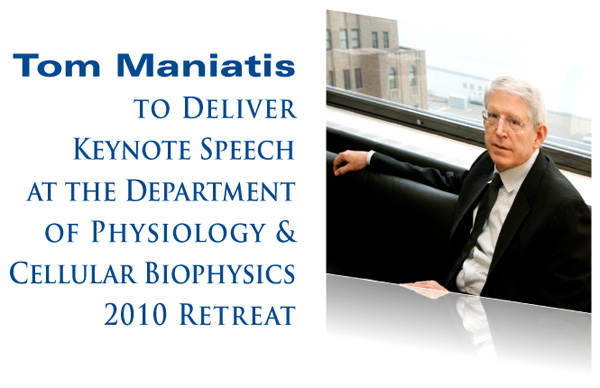| Home | |
| Faculty | |
| Graduate Program | |
| Events and Seminars | |
| Resources | |
| Contact Us | |
|
2 0 1 0 R E T R E A T
Dr. Maniatis, Chairman of the Department of Biochemistry & Molecular Biophysics at Columbia University College of Physicians & Surgeons will deliver the 2010 Department of Physiology and Cellular Biophysics keynote speech on June 18. Maniatis is a graduate of the University of Colorado and one of the founders of molecular cloning. At the age of 28 he received a Ph.D. in Molecular Biology from Vanderbilt University, and he received Honorary PhDs from the University of Athens and the Watson School of Cold Spring Harbor Laboratory. Maniatis carried out postdoctoral studies with Professor Mark Ptashne at Harvard University and with Dr. Fred Sanger at the Medical Research Council Laboratory of Molecular Biology in Cambridge England. Maniatis has held faculty positions at Harvard University, The Cold Spring Harbor Laboratory and the California Institute of Technology.
Tom Maniatis has worked at the forefront of the field of molecular and cellular biology throughout his career. He not only determined the nucleotide sequence of one of lambda’s regulatory elements while working in Fred Sanger’s lab without the aid of standard procedures for DNA sequencing, he also perfected protocols for identifying and isolating genes. Dr. Maniatis is also credited with being a pioneer in the development of gene cloning technology and their application to studies of gene expression. Maniatis has received numerous awards including the 1981 Eli Lilly Research Award in Microbiology and Immunology from the American Society of Microbiology, the 1985 Richard Lounsbery Award for Biology and the 1998 Novartis Drew Award in Biomedical Research, the 2000 AMA Scientific Achievement Award, and the 2001 Pasarow Award in Cancer Research from the Pasarow Foundation. Maniatis was elected to the U.S. National Academy of Sciences in 1985. He is also a pioneer in the biotechnology industry, having cofounded Genetics Institute in 1980, ProScript Pharma in 1994, and Acceleron Pharma in 2004. His contributions to biotechnology were recognized by the Jacob Heskel Gabbay Award in Biotechnology and Medicine, Brandeis University, in 1999.
|

